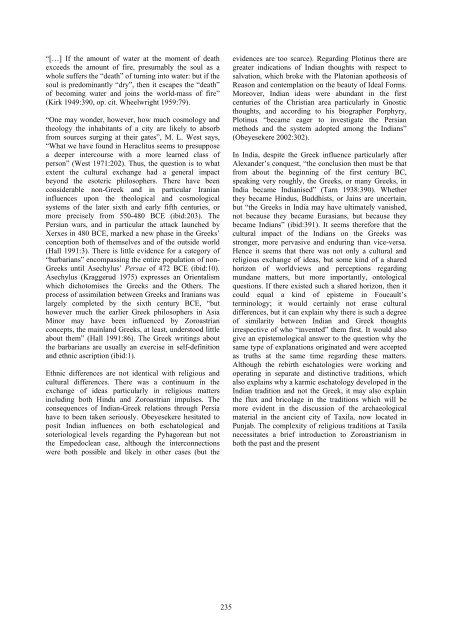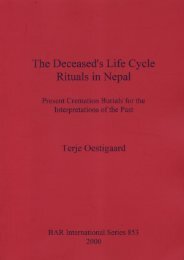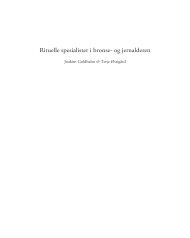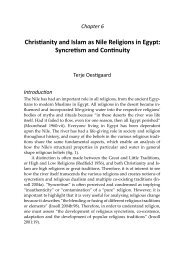Cremation, Caste, and Cosmogony in Karmic Traditions.
Cremation, Caste, and Cosmogony in Karmic Traditions.
Cremation, Caste, and Cosmogony in Karmic Traditions.
You also want an ePaper? Increase the reach of your titles
YUMPU automatically turns print PDFs into web optimized ePapers that Google loves.
“[…] If the amount of water at the moment of death<br />
exceeds the amount of fire, presumably the soul as a<br />
whole suffers the “death” of turn<strong>in</strong>g <strong>in</strong>to water: but if the<br />
soul is predom<strong>in</strong>antly “dry”, then it escapes the “death”<br />
of becom<strong>in</strong>g water <strong>and</strong> jo<strong>in</strong>s the world-mass of fire”<br />
(Kirk 1949:390, op. cit. Wheelwright 1959:79).<br />
“One may wonder, however, how much cosmology <strong>and</strong><br />
theology the <strong>in</strong>habitants of a city are likely to absorb<br />
from sources surg<strong>in</strong>g at their gates”, M. L. West says,<br />
“What we have found <strong>in</strong> Heraclitus seems to presuppose<br />
a deeper <strong>in</strong>tercourse with a more learned class of<br />
person” (West 1971:202). Thus, the question is to what<br />
extent the cultural exchange had a general impact<br />
beyond the esoteric philosophers. There have been<br />
considerable non-Greek <strong>and</strong> <strong>in</strong> particular Iranian<br />
<strong>in</strong>fluences upon the theological <strong>and</strong> cosmological<br />
systems of the later sixth <strong>and</strong> early fifth centuries, or<br />
more precisely from 550-480 BCE (ibid:203). The<br />
Persian wars, <strong>and</strong> <strong>in</strong> particular the attack launched by<br />
Xerxes <strong>in</strong> 480 BCE, marked a new phase <strong>in</strong> the Greeks’<br />
conception both of themselves <strong>and</strong> of the outside world<br />
(Hall 1991:3). There is little evidence for a category of<br />
“barbarians” encompass<strong>in</strong>g the entire population of non-<br />
Greeks until Asechylus’ Persae of 472 BCE (ibid:10).<br />
Asechylus (Kraggerud 1975) expresses an Orientalism<br />
which dichotomises the Greeks <strong>and</strong> the Others. The<br />
process of assimilation between Greeks <strong>and</strong> Iranians was<br />
largely completed by the sixth century BCE, “but<br />
however much the earlier Greek philosophers <strong>in</strong> Asia<br />
M<strong>in</strong>or may have been <strong>in</strong>fluenced by Zoroastrian<br />
concepts, the ma<strong>in</strong>l<strong>and</strong> Greeks, at least, understood little<br />
about them” (Hall 1991:86). The Greek writ<strong>in</strong>gs about<br />
the barbarians are usually an exercise <strong>in</strong> self-def<strong>in</strong>ition<br />
<strong>and</strong> ethnic ascription (ibid:1).<br />
Ethnic differences are not identical with religious <strong>and</strong><br />
cultural differences. There was a cont<strong>in</strong>uum <strong>in</strong> the<br />
exchange of ideas particularly <strong>in</strong> religious matters<br />
<strong>in</strong>clud<strong>in</strong>g both H<strong>in</strong>du <strong>and</strong> Zoroastrian impulses. The<br />
consequences of Indian-Greek relations through Persia<br />
have to been taken seriously. Obeyesekere hesitated to<br />
posit Indian <strong>in</strong>fluences on both eschatological <strong>and</strong><br />
soteriological levels regard<strong>in</strong>g the Pyhagorean but not<br />
the Empedoclean case, although the <strong>in</strong>terconnections<br />
were both possible <strong>and</strong> likely <strong>in</strong> other cases (but the<br />
235<br />
evidences are too scarce). Regard<strong>in</strong>g Plot<strong>in</strong>us there are<br />
greater <strong>in</strong>dications of Indian thoughts with respect to<br />
salvation, which broke with the Platonian apotheosis of<br />
Reason <strong>and</strong> contemplation on the beauty of Ideal Forms.<br />
Moreover, Indian ideas were abundant <strong>in</strong> the first<br />
centuries of the Christian area particularly <strong>in</strong> Gnostic<br />
thoughts, <strong>and</strong> accord<strong>in</strong>g to his biographer Porphyry,<br />
Plot<strong>in</strong>us “became eager to <strong>in</strong>vestigate the Persian<br />
methods <strong>and</strong> the system adopted among the Indians”<br />
(Obeyesekere 2002:302).<br />
In India, despite the Greek <strong>in</strong>fluence particularly after<br />
Alex<strong>and</strong>er’s conquest, “the conclusion then must be that<br />
from about the beg<strong>in</strong>n<strong>in</strong>g of the first century BC,<br />
speak<strong>in</strong>g very roughly, the Greeks, or many Greeks, <strong>in</strong><br />
India became Indianised” (Tarn 1938:390). Whether<br />
they became H<strong>in</strong>dus, Buddhists, or Ja<strong>in</strong>s are uncerta<strong>in</strong>,<br />
but “the Greeks <strong>in</strong> India may have ultimately vanished,<br />
not because they became Eurasians, but because they<br />
became Indians” (ibid:391). It seems therefore that the<br />
cultural impact of the Indians on the Greeks was<br />
stronger, more pervasive <strong>and</strong> endur<strong>in</strong>g than vice-versa.<br />
Hence it seems that there was not only a cultural <strong>and</strong><br />
religious exchange of ideas, but some k<strong>in</strong>d of a shared<br />
horizon of worldviews <strong>and</strong> perceptions regard<strong>in</strong>g<br />
mundane matters, but more importantly, ontological<br />
questions. If there existed such a shared horizon, then it<br />
could equal a k<strong>in</strong>d of episteme <strong>in</strong> Foucault’s<br />
term<strong>in</strong>ology; it would certa<strong>in</strong>ly not erase cultural<br />
differences, but it can expla<strong>in</strong> why there is such a degree<br />
of similarity between Indian <strong>and</strong> Greek thoughts<br />
irrespective of who “<strong>in</strong>vented” them first. It would also<br />
give an epistemological answer to the question why the<br />
same type of explanations orig<strong>in</strong>ated <strong>and</strong> were accepted<br />
as truths at the same time regard<strong>in</strong>g these matters.<br />
Although the rebirth eschatologies were work<strong>in</strong>g <strong>and</strong><br />
operat<strong>in</strong>g <strong>in</strong> separate <strong>and</strong> dist<strong>in</strong>ctive traditions, which<br />
also expla<strong>in</strong>s why a karmic eschatology developed <strong>in</strong> the<br />
Indian tradition <strong>and</strong> not the Greek, it may also expla<strong>in</strong><br />
the flux <strong>and</strong> bricolage <strong>in</strong> the traditions which will be<br />
more evident <strong>in</strong> the discussion of the archaeological<br />
material <strong>in</strong> the ancient city of Taxila, now located <strong>in</strong><br />
Punjab. The complexity of religious traditions at Taxila<br />
necessitates a brief <strong>in</strong>troduction to Zoroastrianism <strong>in</strong><br />
both the past <strong>and</strong> the present











![Fullmono-AK [P2118].indd - oestigaard](https://img.yumpu.com/18994998/1/177x260/fullmono-ak-p2118indd-oestigaard.jpg?quality=85)